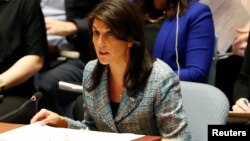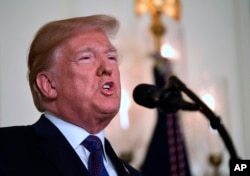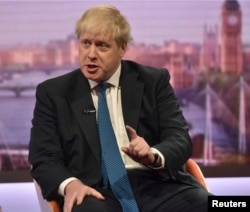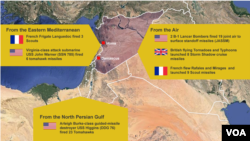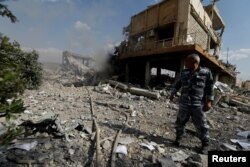Nikki Haley, the U.S. ambassador to the United Nations, warned Syrian President Bashar al-Assad on Sunday that the U.S. would launch new missile strikes against his regime if he carries out another chemical weapons attack.
Haley told Fox News, "If Assad doesn't get it" after Saturday's barrage of 105 missiles fired by the U.S., Britain and France at three Syrian chemical weapons facilities, "it's going to hurt. There will be more. We can't allow even the smallest use of chemical weapons."
She said that it is "entirely up to Assad" whether the missile attack on Syria was a one-time response to the suspected chemical attack by Syrian forces a week ago that killed more than 40 people or part of a continuing allied military effort.
"We'll see how smart he is," Haley said. "We'll watch his actions. Hopefully he's gotten the message."
In a separate interview, Haley told CBS News that new sanctions against Russia, which has forces in Syria supporting the Assad regime, would be announced Monday that would "go directly to any sort of companies that were dealing with equipment related to Assad and chemical weapons use."
U.S. President Donald Trump said on Twitter, "The Syrian raid was so perfectly carried out, with such precision, that the only way the Fake News Media could demean was by my use of the term 'Mission Accomplished.' I knew they would seize on this but felt it is such a great Military term, it should be brought back. Use often!"
Haley, in her Fox News interview, also defended its use as a military term, rather than as a broader political statement. After the middle-of-the-night attack on Syria, some U.S. television commentators poked fun at Trump's use of the "Mission accomplished" term, first used in 2003 by former President George W. Bush, who claimed prematurely and wrongly that the U.S. had successfully completed its military attack on Iraq.
"We all know our work in Syria is not done," she said.
Haley rejected the premise posed by Fox News anchor Chris Wallace that the U.S. has condoned Assad's use of conventional weapons to kill rebels attacking his forces, just not chemical agents.
"I don't say we've ever said it's OK," she said. "We can't control what a country does to its people."
With Russian involvement in Syria and Moscow condemning Saturday's allied missile strike, Haley acknowledged that U.S.-Russian relations are at a low point.
"Everything that has strained the relationship is on Russia's side," she said, adding that the U.S. hopes for improved relations with Moscow, but that "we're not going to put up with bad behavior to get it."
Much like U.S. statements, Britain's foreign secretary Boris Johnson said there are no plans to launch additional military strikes against Syria, but that his country and its allies will consider further action if Assad uses chemical weapons against his people in the future.
U.S. military officials said an initial assessment showed every one of the missiles struck its target on Saturday, reducing the facilities to rubble while avoiding any civilian casualties. The operation targeted three Syrian chemical weapons facilities — one in the capital of Damascus and two others near Homs, near the border with northern Lebanon.
The action was in response to a recent deadly attack in the town of Douma. The U.S. and its allies accused Assad's forces of using chemical weapons, a claim Syria and Russia have rejected.
U.S. defense officials say they have high confidence chlorine gas was used and are still assessing evidence indicating the presence of sarin gas. But late Saturday, senior administration officials called the evidence “incontrovertible.”
The Syrian Foreign Ministry Saturday condemned what it called “the brutal American-British-French aggression… which constitutes a flagrant violation of international law."
Russia also decried the U.S.-led operation as a failure, saying the majority of the rockets fired at Syria were intercepted by the Syrian government's air defense systems.
Russian news agencies reported that Russian President Vladimir Putin, in a phone call, told Iranian President Hassan Rouhani there would be chaos in international relations if there are further Western strikes on Syria.




